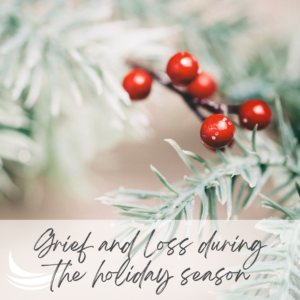 Loss in general is not easy but particularly if you are grieving during the holiday season. If you had a choice of losing something or gaining something, I agree that most people would choose the second option.
Loss in general is not easy but particularly if you are grieving during the holiday season. If you had a choice of losing something or gaining something, I agree that most people would choose the second option.
Human life is especially precious.
You may have the belief that you need to let go and move on or perhaps stay in a constant state of suffering but what would it be like to sit with the emotions and allow them to co-exist?
Could it be possible to create space for happiness and joy amid grief?
What would it be like to integrate your experiences and make space for experiences that are painful while giving yourself permission to receive experiences that bring pleasure?
This may appear to be paradoxical. How can I experience joy while I am grieving? All-or-nothing-thinking would mean that I am either happy or sad; however, this is also a common cognitive distortion. The life cycle of emotions tends to be fleeing. Did-you-know-that-most-emotions-last-90-seconds? Our emotions encompass experiences that combine physiological arousal; however, feelings are also influenced by our interpretation of how we perceive a situation.
The holidays may not ever feel the same now that “______” [fill in the blank of your loved one’s name] is no longer here. It can feel almost surreal to enter an environment in which the deceased is now missing.
The void of loss can be profound, and the secondary loss can be especially devastating. Many family dynamics change after the death of central figures who tend to be the “glue” that keeps family gatherings and traditions alive.
As you grieve, please also open yourself to the idea of creating-new-tradition-after-a-death.
Check out some of these examples to try this holiday season that keeps the memories and holiday traditions alive after the loss of a loved one.
Food & music: Cook and serve special food items that were a favorite of a loved one. Perhaps it was an item that they would regularly share with family and friends. Celebrations such as birthdays and holidays are a great time to honor the deceased with festive foods. You can also combine well-loved music or other symbolic items from their culture.
Symbolic activities: Lighting a candle, having an extra plate at the dinner table, visiting a gravesite, saying a prayer, or blessing, and having a moment of silence are all examples of symbolic activities. Consider filling in the role within your family if there is a void after the death of a loved one. Perhaps you could stay a new tradition that helps bring others together such as hosting gatherings.
Mementos: Create a special gift in honor of the deceased such as a pillow or quilt from the clothing of the deceased or another craft item (the options are endless!) a photo memory gallery, poem, or painting are a few to get you started.
Memories: Telling stories, sharing photos, and enjoying memories while connecting and investing in your current relationships, especially those with special significance can help ease the pain with support.
Charitable donations: Consider giving back to a cause that is meaningful to you. For example, if you have lost a loved one from cancer, consider volunteering by giving your time or a financial gift (in their name) to help benefit a good cause.
A final reminder: Show gratitude for those who are currently in your life.
Let a loved one know that you are thinking about them and take the time to express a heartfelt message about what their relationship means to you. Write a letter or send a care package. Consider spending some quality time together. Share your love in a meaningful way. Offer to provide some respite to those who are in a caregiver role.
One common source of regret is not spending enough time with loved ones. This holiday season, I encourage you to be available for the people who are important in your world, choose to love one another and celebrate life.
Written By: Charlotte Johnson, MA, LPCC
We’re Here to help
Our wellness experts will be happy to take care of you. You can CLICK HERE to schedule an appointment now or call (612)223-8898.
Meet Clinicians
We’re united by our commitment to providing effective, relevant, and innovative mental health support at all stages of your journey. Click Here to find a therapist or find out more about who we are, where we come from, and how we live out CARE’s mission every day.
The professionals at CARE are actively collecting and creating resources to help with what you need and address frequently asked questions. We’re Here for You.



